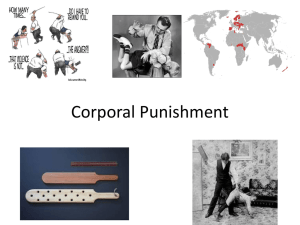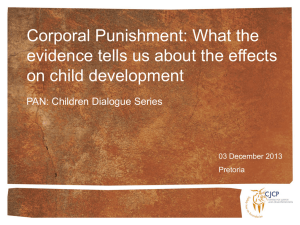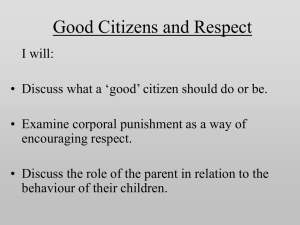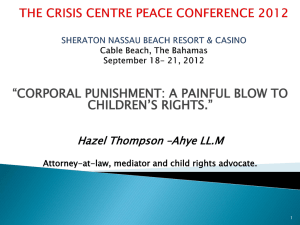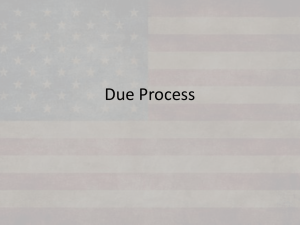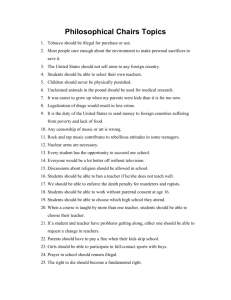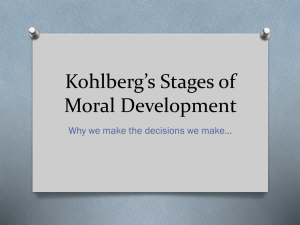1 The human rights obligation to prohibit corporal punishment This
advertisement
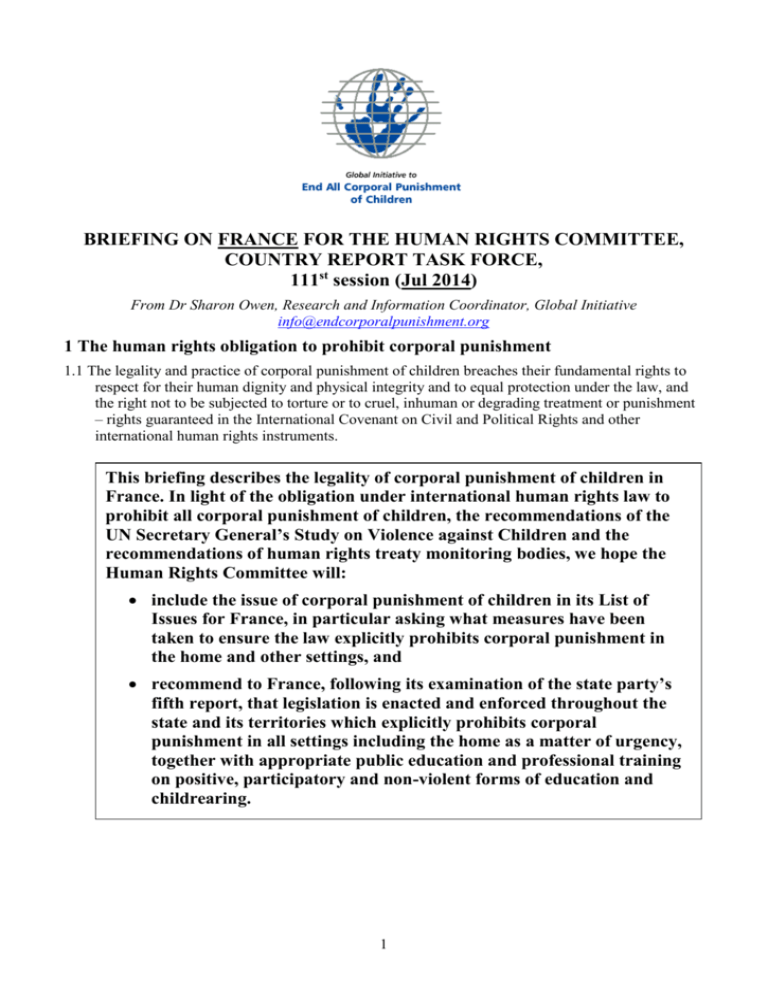
BRIEFING ON FRANCE FOR THE HUMAN RIGHTS COMMITTEE, COUNTRY REPORT TASK FORCE, 111st session (Jul 2014) From Dr Sharon Owen, Research and Information Coordinator, Global Initiative info@endcorporalpunishment.org 1 The human rights obligation to prohibit corporal punishment 1.1 The legality and practice of corporal punishment of children breaches their fundamental rights to respect for their human dignity and physical integrity and to equal protection under the law, and the right not to be subjected to torture or to cruel, inhuman or degrading treatment or punishment – rights guaranteed in the International Covenant on Civil and Political Rights and other international human rights instruments. This briefing describes the legality of corporal punishment of children in France. In light of the obligation under international human rights law to prohibit all corporal punishment of children, the recommendations of the UN Secretary General’s Study on Violence against Children and the recommendations of human rights treaty monitoring bodies, we hope the Human Rights Committee will: include the issue of corporal punishment of children in its List of Issues for France, in particular asking what measures have been taken to ensure the law explicitly prohibits corporal punishment in the home and other settings, and recommend to France, following its examination of the state party’s fifth report, that legislation is enacted and enforced throughout the state and its territories which explicitly prohibits corporal punishment in all settings including the home as a matter of urgency, together with appropriate public education and professional training on positive, participatory and non-violent forms of education and childrearing. 1 2 Legality and practice of corporal punishment of children in France 2.1 Corporal punishment of children in France is unlawful as a sentence for crime; it is considered unlawful in penal institutions but there is no explicit prohibition in law. Corporal punishment is not explicitly prohibited in the home, schools and alternative care settings. 2.2 Home (lawful): Corporal punishment is lawful under the “right of correction” in customary law. For example, in 1819 the Supreme Court ruled that parents have this right;1 a ruling in 1967 stated that this right does not apply when the child’s health is placed at risk.2 Provisions against violence and abuse in the Criminal Code 1994, the Civil Code, Act No. 2007-293 reforming child welfare and Act No. 2006-399 concerning domestic violence and violence against children are not interpreted as prohibiting all corporal punishment in childrearing. A bill to abolish all forms of physical and psychological violence against children,3 intended to prohibit all corporal punishment in childrearing, was filed in the National Assembly in 2010 but died before being debated. However, in May 2013, France accepted the recommendations to prohibit corporal punishment of children in all settings made during the UPR earlier in 2013.4 2.3 In interviews with 1,000 parents, 72% said they had “mildly” slapped their child on the face, 87% on the bottom; 32% had given their child a “resounding” slap on the face; 4.5% had beaten their child with an object; 7.9% never used corporal punishment; 85% agreed that “one should try to use as little corporal punishment as possible”, and 82.5% agreed that “non-violent child-rearing is the ideal”.5 A survey of 2,000 grandparents, parents and children found that 95% of adults and 96% of children had been smacked; 84% of grandparents and 87% of parents had administered corporal punishment; one in ten parents admitted to punishing their children with a “martinet” (a small whip); 30% of children said they had been punished with a martinet.6 2.4 Alternative care settings (lawful): Corporal punishment is lawful under the customary “right of correction” (see para. 1.2). 2.5 Day care (lawful): Corporal punishment is lawful under the customary “right of correction” (see para. 1.2). In 2003 the Supreme Court confirmed that nannies and babysitters have this right. 2.6 Schools (lawful): Ministerial circulars state that corporal punishment should not be used in schools7 but there is no explicit prohibition in law and “light correction” is tolerated in the same way as it is for parents. In 1908, the Supreme Court confirmed that teachers have a “right of correction”;8 a ruling in 2000 stated that this did not apply to habitual and “non-educational” corporal punishment.9 A 2002 case found that a teacher did not have the right to habitually pull pupils’ hair, kick their behinds and slap their faces but did not rule out all corporal punishment.10 According to the national report to the European Committee of Social Rights in 2010, judicial decisions have acknowledged the “right of correction” by parents, teachers and educators and laid down the conditions that it must be (i) harmless, (ii) of moderate intensity (slaps, clothes seized, ears and hair pulled) and (iii) aimed at maintaining school order and discipline.11 2.7 Penal institutions (not explicitly prohibited): Corporal punishment is considered unlawful, but there is no explicit prohibition in legislation. The Code of Criminal Procedure 1994 provides for 1 Court de Cassation, Criminal Chamber, 17 December 1819, S. 1819-1821, chron., p. 152 Cour de Cassation, Criminal Chamber, 21 February 1967, Bull. Crim., No. 73 3 Bill No. 1971 4 28 May 2013, A/HRC/23/3/Add.1, Report of the working group: Addendum, para. 10 5 Bussmann, K. D. (2009), The Effect of Banning Corporal Punishment in Europe: A Five-Nation Comparison, MartinLuther-Universität Halle-Wittenberg 6 Union of Families in Europe (2007), POUR ou CONTRE les fessées?, Tassin: UFE 7 Circular No. 91-124 of 6 June 1991 regarding primary schools and Circular No. 2000-105 of 11 July 2000 for secondary schools 8 Cour de Cassation, Criminal Chamber, 4 December 1908, Bull. Crim., No. 482 9 Court of Appeal, Nancy, 17th January 2000 10 Cour de Cassation, Criminal Chamber, November 26 2002, case n° 02-81727 11 16 December 2010, RAP/RCha/FR/X(2010), pp. 54-55 2 2 respect for human dignity (art. D.189) and prohibits violence towards detainees (art. D.220). A decree of 4 April 1996 and its implementing circular of 12 April 1996 prohibit cruel, inhuman or degrading punishment. 2.8 Sentence for crime (unlawful): There is no provision for judicial corporal punishment in criminal law. 3 Legality of corporal punishment of children in the French overseas territories etc 3.1 The legality of corporal punishment in the French overseas territories etc is summarised in the table below. 3.2 Under article 73 of the French Constitution 1958, the national laws and regulations of France apply fully and automatically in the overseas departments and regions (French Guiana, Guadeloupe, Martinique and Réunion) with adaptations possible to take account of special characteristics. Departments may make regulations in limited areas but these exclude nationality, civic rights, civil liberties, personal status, justice, criminal law, criminal procedure, foreign policy, defence, public security and public order, currency, credit and exchange and electoral law. 3.3 Under article 74 of the French Constitution overseas collectivities (French Polynesia, Mayotte, St Barthelemy, St Martin, St Pierre et Miquelon and Wallis and Futuna Islands) enjoy a varying degree of autonomy which may or may not distinguish them from metropolitan France. The division of competences between the French state and the collectivity is set out in an institutional law; some collectivities are subject to the legislative speciality rule whereby national laws and regulations do not apply unless this is expressly provided for. 3.4 Under articles 76 and 77 of the French Constitution, New Caledonia constitutes a distinct category; it is governed by the legislative speciality rule (see above). 3.5 The following table summarises the legality of corporal punishment in the French overseas departments and territories. The information is basically the same as that for France: square brackets indicate information unconfirmed, an asterisk indicates that corporal punishment is considered unlawful but there is no explicit prohibition in legislation. State Prohibited in the home Prohibited in day care Prohibited in schools NO NO NO NO NO Prohibited in alternative care settings NO NO NO NO NO French Guiana Guadeloupe Martinique Reunion French Polynesia Mayotte St Barthelemy St Martin St Pierre et Miquelon Wallis and Futuna Islands New Caledonia NO NO NO NO NO Prohibited in penal institutions YES* YES* YES* [YES] YES* Prohibited as sentence for crime YES YES YES YES YES NO NO NO NO NO NO NO NO NO [NO] NO NO [NO] [NO] NO NO [NO] [NO] NO NO [NO] [YES] YES* YES* [YES] YES YES YES YES NO [NO] [NO] NO [YES] YES NO NO NO [NO] [YES] YES 3 4 Recommendations by human rights treaty bodies and during the UPR 4.1 CRC: The Committee on the Rights of the Child first made recommendations to France concerning corporal punishment of children in 1994.12 In 2004,13 the Committee recommended explicit prohibition in all settings including the home, and reiterated this recommendation to France and the overseas departments and territories in 2009.14 4.2 ECSR: The European Committee of Social Rights has concluded three times that the situation in France is not in conformity with article 17.1 of the Revised European Social Charter because corporal punishment of children is not prohibited – in 2003, 2005 and 2012.15 A complaint has been brought against France by the Association for the Protection of All Children (APPROACH) Ltd, under the collective complaints procedure of the European Committee of Social Rights.16 The complaint alleges that, in breach of the European Social Charter, there is no explicit and effective prohibition of all corporal punishment in the family, schools and other settings and that France has failed to act with due diligence to eliminate such punishment in practice. The complaint was registered by the Committee in February 2013; it was declared admissible on 2 July 2013. 4.3 UPR: During the second cycle Universal Periodic Review of France in 2013, the Government accepted a number of recommendations to explicitly prohibit corporal punishment of children in all settings, including the home.17 Briefing prepared by the Global Initiative to End All Corporal Punishment of Children www.endcorporalpunishment.org; info@endcorporalpunishment.org April 2014 12 25 April 1994, CRC/C/15/Add.20, Concluding observations on initial report, para. 24 30 June 2004, CRC/C/15/Add.240, Concluding observations on second report, paras. 38 and 39 14 11 June 2009, CRC/C/FRA/CO/4 Advance Unedited Version, Concluding observations on third/fourth report, paras. 6, 57 and 58 15 1 October 2003, Conclusions 2003 Vol. 1, page 173; March 2005, Conclusions 2005; January 2012, Conclusions 2011 16 Collective complaint No. 92/2013, Association for the Protection of All Children (APPROACH) Ltd v France 17 21 March 2013, A/HRC/23/3, Report of the working group, paras. 120(116), 120(117) and 120(118); 28 May 2013, A/HRC/23/3/Add.1, Report of the working group: Addendum, para. 10 13 4
